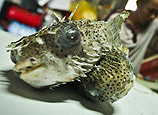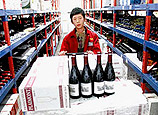
While touching on the raw emotional nerves, the Butterfly story, supposedly taking place in late 19th century, is simplistic in its portrayal of the title character. Cio-Cio San, though a teenager, is a geisha who should be familiar with the worldly affairs. The tenacity with which she breaks with her roots and plunges into what she believes is true love is tinged with a psychosis. You may say people so deeply mired in love can be delusional, but it's not just an Asian thing. Sometimes, love does not triumph over such mundane things as culinary habits or the difference of using a toothpaste — with the woman neatly squeezing from the lower tip and the man doing it haphazardly.
If a man, from whichever country, goes around in search of "Butterflies" to be rescued, believing poverty induces obedience, he is in for a shock. Women from disenfranchised places or social status may have the vulnerable facade, but their tough life has given them strength often belied by their appearance. Cui's depiction of them as "control freaks", though hyperbolic, is not completely groundless.
Of course, like all stereotypes, those surrounding mixed matrimonies may have sprung from some true stories, but grew incurably simplistic, shorn of the complexities of human interaction. Even two people with identical backgrounds and personality may run into conflict when they live together as a couple for a sustained period of time. In a day and age when interracial or transnational marriages no longer make headlines, whatever virtue or vice exhibited by one person is not automatically assigned to so-called "national traits".
To borrow from Leo Tolstoy, whose three lead characters in Anna Karenina do not transcend national or social limits, happy families are all alike, and every unhappy family is unhappy in its own way. When soy sauce or tomato sauce is the cause of a family's downfall, it bespeaks a much deeper rift that may not be repaired with gastronomy.
 |
















 First alpine rail gets midnight maintenance
First alpine rail gets midnight maintenance


![]()
